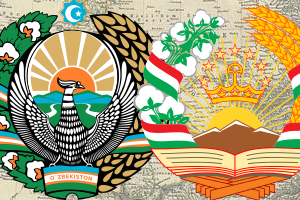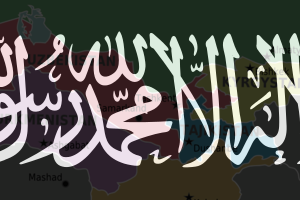The Uzbek-Tajik détente: can it last?
By George Voloshin (08/07/2015 issue of the CACI Analyst)
On June 22-24, Uzbekistan’s capital, Tashkent, hosted a third meeting of the Uzbek-Tajik intergovernmental commission on economic cooperation. Unlike the two previous sessions, which were organized in Dushanbe in August 2002 and February 2009, this year’s bilateral trade talks took place against the backdrop of an emerging détente between the two Central Asian neighbors. Uzbekistan and Tajikistan are currently confronted with a host of shared challenges ranging from the threat of radical Islam to socioeconomic instability, while their bilateral relationship is still constrained by unsettled disputes from the past.

Islamic State in Central Asia: threat or opportunity
By Charlie Smith (08/07/2015 issue of the CACI Analyst)
Central Asia is a key region that many believe has fallen into the crosshairs of the terrorist group calling itself the Islamic State (ISIS). Local governments are gravely concerned about returning fighters and possible ISIS infiltration in the region, and foreign powers, especially neighboring Russia and China, have expressed their deep concerns. This grim picture, however, obscures a more complex, and perhaps more accurate, story. Might the specter of ISIS have less to do with its on-the-ground ability to destabilize the region and more to do with the geopolitical concerns of those who are stating these threats?

Bishkek and Tashkent Face Uneasy Relations
By Arslan Sabyrbekov (06/24/2015 issue of the CACI Analyst)
On June 10, Kyrgyzstan marked the fifth anniversary of the tragic inter-ethnic violence that claimed more than 400 lives, displaced tens of thousands of people and destroyed thousands of households. In the aftermath of the bloody events, the President of neighboring Uzbekistan, Islam Karimov, issued a statement that third forces provoked the clashes between Kyrgyz and Uzbeks, and the Kyrgyz leadership agreed. However, recent developments indicate that Karimov’s position vis-à-vis the authorities in Bishkek and the conflict has changed into a more confrontational stance.
Karimov’s changing mood became apparent after his remarks to his Kyrgyz counterpart at the informal summit of the CIS states held in Moscow on May 8, in connection with the celebration of the 70th anniversary of the victory against Nazi Germany. At the summit, Kyrgyzstan’s President Almazbek Atambayev stated that, “It is of course sad that not everybody could make it to this summit because, to some extent, it is a tribute and respect for fathers and grandfathers, mothers and grandmothers who were in the war. I think that this day should remain in the memory of all countries because the future will punish those who forget the past.”
In response to this statement, the Uzbek President said that every democratically elected leader is in a position to decide what to celebrate and where, and no one has the right to force his opinion on others. Karimov continued by referring to his Kyrgyz colleague as simply “Almaz” and described his statements as incorrect and tactless. Atambayev interfered, stating that he was simply expressing his opinion, but Karimov ironically interrupted him by saying, “We all know your opinion already.”
Nevertheless, during his bilateral talks with the United Nations’ Secretary General Ban Ki-moon, Karimov described the June 2010 events in southern Kyrgyzstan as a full-scale war. “Power holders in Kyrgyzstan did not draw any conclusions. The causes of the conflict need to be investigated at an international level,” Karimov noted, despite the fact that the inter-ethnic clashes were investigated by a national as well as an international commission led by the Organization for Security and Cooperation in Europe. This is in stark contrast to the Andijan massacre of 2005, which were never evaluated either by national or international commissions.
Yet Karimov touched on a weak spot by pointing to Kyrgyzstan’s failure to bring the perpetrators to justice. Well-respected international human rights organizations have also called on the Kyrgyz authorities to retry all those convicted following the June 2010 inter-ethnic clashes, a trial that according to them saw ethnic Uzbeks sentenced at a higher proportion that then their Kyrgyz counterparts. Such a retrial would involve the case of the human rights defender and ethnic Uzbek Azimjan Askarov, sentenced to life for organizing mass disturbances and instigating inter-ethnic violence in southern Kyrgyzstan in 2010. According to Rachel Denber of Human Rights Watch, “In the case of Azimjan Askarov, the Kyrgyz justice system has utterly failed to deliver justice. The case was riddled with blatant flaws from start to finish, and it is astounding that the court did not order a thorough investigation into the way it was conducted.”
In general, Bishkek-Tashkent relations have always been uneasy. The two countries have been divided not only over the ethnic clashes between Uzbeks and Kyrgyz in southern Kyrgyzstan, but also on numerous border conflicts and the constant struggle for water resources. According to local political analysts, Karimov’s increasingly critical statements addressed to Bishkek might be guided by geopolitical interests. In a number of interviews, Uzbekistan’s president has stated that Tashkent will not enter the Eurasian Economic Union, the Customs Union or any other alliance that is reminiscent of the Soviet Union, unlike Bishkek, which is pursuing the opposite foreign policy.
Also, earlier this year Kyrgyzstan approved the sale of its gas network to Russia’s Gazprom for the symbolic price of US$ 1 and is now receiving its energy supplies without any delay. This has removed Tashkent’s leverage, which it has previously deployed to bully Bishkek by cutting off supplies during winter. Such developments, along with Bishkek re-equipping its military with the Kremlin’s assistance might are indeed irritants to power holders in Tashkent.
CACI Analyst, April 1, 2015
Contents
Analytical Articles
IRAN, A NUCLEAR TREATY, AND ITS NEIGHBORS, by Stephen Blank
THE PROSPECTS OF IS IN AFGHANISTAN, by Sudha Ramachandran
AZERBAIJAN AND KAZAKHSTAN FACE TOUGH ECONOMIC DECISIONS AMID DECREASING OIL PRICE, by Nurzhan Zhambekov
CONFLICT-RELATED VIOLENCE DECREASES IN THE NORTH CAUCASUS AS FIGHTERS GO TO SYRIA, by Huseyn Aliyev
Field Reports
KYRGYZSTAN'S PRESIDENT MAKES UNANNOUNCED VISIT TO MOLDOVA, by Arslan Sabyrbekov
PRIVATIZATION IN UZBEKISTAN: THE NEXT DOUBLE, by Umida Hashimova
ACUTE POLITICAL CONFRONTATION SIMMERS IN GEORGIA, by Eka Janashia
TAJIKISTAN'S OPPOSITION SUFFERS KIDNAPPINGS AND ASSASSINATIONS, by Oleg Salimov
Privatization in Uzbekistan: The Next Double
By Umida Hashimova (04/01/2015 issue of the CACI Analyst)
Privatization is a sore subject in Uzbekistan. Cases of expropriation of foreign and local companies in the past have painted a discouraging picture for private business in the country. Uzbekistan is also criticized for a government-controlled slow privatization process that has been continuing at a snail’s pace since the early days of independence. Uzbekistan’s import-substitution and export-oriented industrialization policy is also not popular among backers of a liberal economy.
Yet, privatization gained renewed attention when, on January 16, 2015, Uzbekistan’s President Islam Karimov requested the Cabinet of Ministries to develop a program on restructuring, modernization and diversification of production for 2015-2019 with a focus on privatization. This was the first presidential-level request for privatization and thus very important for elevating the topic’s importance. In a government like Uzbekistan, what the head of the country says today becomes law tomorrow with ensured follow-through.
The Program on Privatization is under development and is envisioned to encompass full-scale and pivotal analysis of the government’s presence in the economy, aiming to decrease the state presence and increase the share of the private sector. The program prescribes a three-fold reduction of state-owned enterprises: 534 companies that have state shares in nominal capital will be reduced to 147, and 660 non-working enterprises will later be sold to private individuals. The World Bank and the International Finance Corporation were for the first time actively included in the program development process to solicit their expert opinion on the privatization process, with the first round of meetings organized in March 2015.
In the most recent World Bank and State Department reports, however, privatization and foreign investment did not receive high marks. In the Uzbekistan Country Program Snapshot for 2014, the World Bank mentions that the net inflow of foreign direct investments (FDI) has been decreasing in recent years. Cumulative per capita FDI inflows are low due to the government’s reluctance to fully open the economy and improve the foreign investment climate in some areas. The State Department’s Investment Climate report for 2014 pointed out that “access to currency conversion, debilitating red tape, an onerous system of taxation, overregulated banking, and punitive customs laws and procedures” are the most important issues mentioned by foreign and domestic investors, followed by expropriation cases and politically-motivated inspections of companies. The same report says that Uzbekistan’s investment legislation provides a range of guarantees for foreign investors, but the legislation is ambiguous and self-contradicting.
When this author raised these issues from the State Department report with Uzbek officials familiar with developments in the privatization area, they said (on condition of anonymity) that in most expropriation cases, companies seek to abuse domestic laws that allow tax-free import of machinery to Uzbekistan. They then fail to produce a final product through localized production as stipulated in the agreement signed by investors. The officials added that in some expropriation cases, the final product fails to materialize by the deadline of an agreement. Overall, they claimed Uzbekistan currently has around 31,000 private companies and the majority of them are working successfully.
When the author asked the same officials why the Privatization Program is being developed now, 24 years after the privatization process started in the early 1991s, they responded that the government is now more confident to give up state assets because it is certain that privatization can be implemented without disruptions. Unsuccessful early privatization processes in Russia and other former Soviet countries made Uzbekistan hesitant to rush into the privatization process. Furthermore, they added, the government focused on developing a legislative basis for privatization that among others things would protect socially vulnerable groups who could have been disadvantaged by privatization. In preparation for the privatization process, the government was also busy establishing colleges with foreign partners that would provide the younger generation with business-oriented education.
The State Department’s Investment Climate report recognized improvements, such as amendments to the Law on Foreign Investments (effective January 20, 2014), which introduced a single-window process for the registration of businesses, requiring no more than seven days to finish registration from the submission of an application.
The recent developments in privatization at the presidential level might indicate that Uzbekistan’s government has depleted its measures to control the economy and is ready for the next step. However, the question remains if the economy’s modernization and market-oriented reforms will continue while the government is implementing strong import-substitution strategies. The development of the privatization program at the president’s request in partnership with international organizations is a signal that Uzbekistan’s government is increasingly interested in seriously improving the country’s investment and business climate as state assets are being prepared for divesture.




